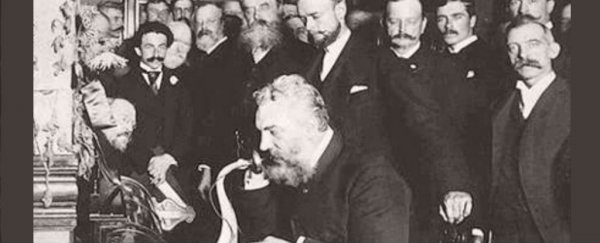Alexander Graham Bell made his name as the inventor of the world's first practical telephone, but his genius wasn't just limited to revolutionary inventions. He not only predicted today's looming energy crisis - he also offered up a solution complete with solar panels and biofuel.
Turns out, in a 1917 article written for National Geographic magazine, Bell made an eerily accurate prediction about our unbridled use of fossil fuels, and later speculated that Earth would become a "hot-house".
According to a biography co-written by Bell's great-grandson, Edwin S. Grosvenor, a handful of scientists were discussing the potential global effects of air pollution more than a century ago, and Bell bucked the trend with his "hot-house" predictions.
"The few scientists who thought about [air pollution in 1917] were convinced that dirtier air would mean that the climate would cool as the Sun's warming rays were blocked. Bell reasoned differently," Grosvenor and co-author Morgan Wessen wrote in 1977.
"While we would lose some of the Sun's heat," Bell is quoted as saying, "we could gain some of Earth's heat, which is normally radiated into space."
"I am inclined to think we would have some kind of greenhouse effect. … The net result is that the greenhouse becomes a hot-house."
Bell's been credited as having coined the phrase "greenhouse effect", but it appears to have been used almost a decade before these musings, by English physicist John Henry Poynting.
In 1909, he refers to the "blanketing effect" of air pollution as "'greenhouse effect' of the atmosphere", and while his scientific musings were quickly dismissed, the phrase caught on, appearing in several journal articles in the early 1900s.
Fast-forward to 1917, and Bell was asked to address to the graduating class of the McKinley Manual Training School in Washington, DC, where he took the opportunity to air a multitude of problems facing the world at that moment, such as how to take a warm bath at 2am, and "Could postage stamps be used in transportation of persons?"
The speech was revised for an edition of National Geographic magazine later that year, and in it, he also considered the challenges faced by a world that progressed "from candles to electricity in one lifetime", predicting that we would not stop using coal and oil until the supplies literally dried up.
"Coal and oil are going up and are strictly limited in quantity. We can take coal out of a mine, but we can never put it back. We can draw oil from subterranean reservoirs, but we can never refill them again," he said.
"In relation to coal and oil, the world's annual consumption has become so enormous that we are now actually within measurable distance of the end of the supply. What shall we do when we have no more coal or oil!"
One of the OG proponents of renewables, Bell touts tidal and wave power, "which we have not yet learned to utilise", and "the employment of the Sun's rays directly as a source of power".
It's Bell's proposals of how to use solar power that might just give him away as a secret time traveller, because in Grosvenor and Wesson's biography, they described how in 1914, he'd even sketched out some rooftop solar devices.
"Every town or city has a vast expanse of roof exposed to the Sun," he's quoted as saying. "There is no reason why we should not utilise the roofs of our houses to install solar apparatuses to catch and store the heat received from the Sun."
"Solar heat, like the heat passing up a chimney, represents a waste product. We have it, but we do not use it; and then we call out against the price of the coal bill."
?
Before we get into Bell's slightly less-successful soothsaying, let's just take a moment to appreciate how relevant this all is.
And then we get to Bell's favourite alternative energy source - alcohol, that "beautifully clean and efficient fuel".
Bell advocated the use of alcohol made from sawdust and cornstalks as a readily available source of biofuel, and predicted that:
"The world will probably depend upon alcohol more and more as time goes on, and a great field of usefulness is opening up for the engineer who will modify our machinery to enable alcohol to be used as the source of power."
From algae to bacteria, biofuels haven't exactly set the world on fire, and despite major advances in ethanol fuel production, we're still waiting for the results.
But let's just say, if Alexander Graham Bell and Carl Sagan took some time out of zipping around the Universe as ghostly apparitions - just kidding - to see what 2017 actually looks like, they'd probably be equal parts bemused and horrified by how accurate their predictions were.
